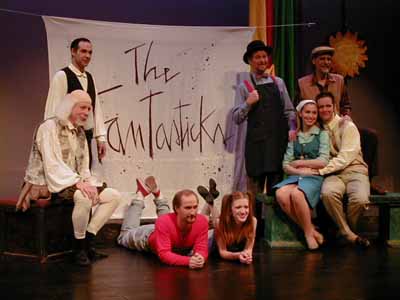|
The Reston Players' Production of The Fantasticks The Washington Post, March 21, 2002 |

|
|
The Reston Players' Production of The Fantasticks The Washington Post, March 21, 2002 |

|
| washingtonpost.com
In Reston's 'Fantasticks,' The Strength of Simplicity By Michael Toscano
"The Fantasticks," the off-Broadway play that closed in January after 42 years, is famous primarily for being famous -- kind of like Zsa Zsa Gabor, only its beauty doesn't fade. A dreamy tale of youthful illusion and love, it opened in 1960 but never made it to Broadway from Greenwich Village and was never particularly beloved by critics. "The Fantasticks" held on originally because it was an inexpensive, simple show that just enough of the theater crowd found endearing. As the 1960s gave way to the '70s and beyond, tourist curiosity about the little show that wouldn't die kept it going. The producers finally closed the New York show after 17,162 performances, an American theater record that may never be topped. But "The Fantasticks" remains alive, a staple in community theaters everywhere. Brilliantly presented last fall by the McLean Theatre Alliance, the show is now being produced by the Reston Community Players, directed by Terri Caretti. If it seems familiar, it's not just the lovely score, which includes such standards as "Try to Remember" and "Soon It's Gonna Rain"; several of the McLean performers are reprising their roles in Reston. "The Fantasticks" is a stylized, storybook confection of poetic dialogue, beautiful ballads and charming fairy tale characters. Young Matt and Luisa secretly fall in love, even as their fathers pretend to be feuding, certain their children would rebel if they knew the adults really wanted them together. To end the fake feud, the old men hire the dark and brooding El Gallo to feign kidnapping Luisa so Matt can be a hero by "rescuing" her. The plan succeeds, and the young lovers are united. Most plays of this sort end right there. But Tom Jones, who wrote the book and lyrics, and Harvey Schmidt, who provided the music, serve up a nasty twist. When romantic moonlight gives way to harsh sunlight and romantic illusion is replaced by reality, the couple's bond quickly withers. It seems love is wasted on ingenues. Or, as "Try to Remember" puts it, "Without a hurt, the heart is hollow." In the second act, life teaches some painful lessons. Roy Leatherby is Matt, the Boy, and Philip Baedecker is Henry, the Old Actor, the parts they so capably filled in McLean. Leatherby effectively manages the transition from callow youth to seasoned young man, while Baedecker provides a rich characterization of the old Shakespearean ham, his dusty voice rising to rotund proportions when the spotlight falls upon him, his body creaky with age. Unfortunately, Baedecker is hampered by being paired with Chris Fouts as Mortimer, the Man Who Dies. Fouts's artless performance fails to help generate the big laughs these two characters normally earn. Laurie Saylor is a wonderfully fresh-faced Luisa, her clear voice perfect for expressing naivete. She is most effective in the second act when Doug Sanford, as El Gallo, teaches Luisa about the world in an enchanting swirl of music, dance and color. Another highlight is the "sword fight" between El Gallo and Matt, plotted by stage combat choreographer Kevin Robertson more as clever dance than duel. Music is provided by piano, cello and harp, augmenting the ethereal atmosphere created by the flowing, colorful streamers of Eileen Mullee's set design and Frank Coleman's evocative lighting. Bob Patterson is a crusty but charming Hucklebee, the Boy's Father, and Don Paul Smith is Bellomy, the Girl's Father. The fathers' duet "Never Say No" usually brings the house down, but Smith's singing goes flat, making the harmonies somewhat dissonant and robbing the numbers of their magic. Adding some magic, though, is Shannon Dunne as the Mute, the all-purpose free spirit to whom Dunne gives some clever pixieish touches. |